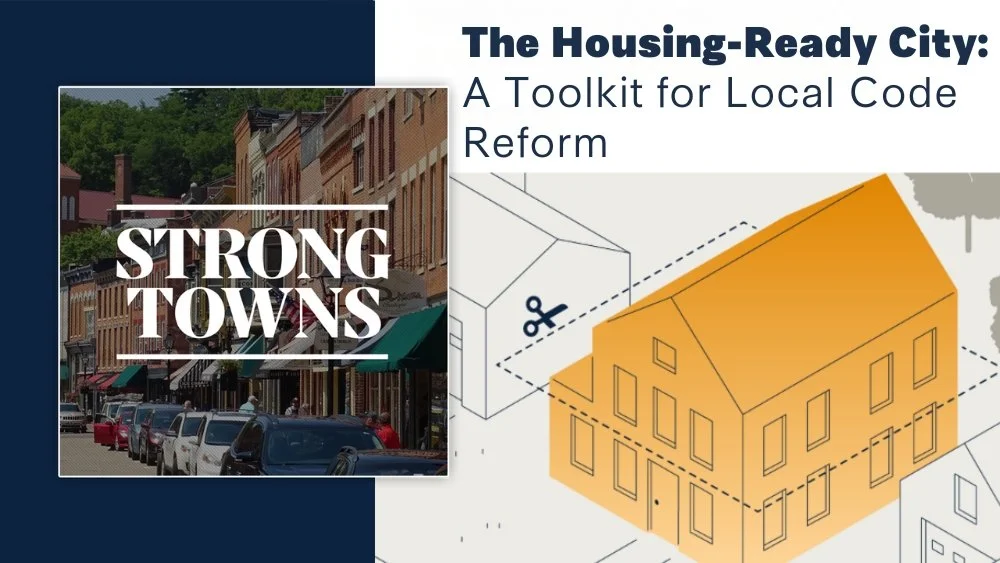Back in September, Sacramento became the first city in California to allow multiunit housing in all residential neighborhoods. Here’s what that means for residents seeking housing.
Read MoreChuck is joined by Seth Zeren, a neighborhood real estate developer, to discuss the six code reforms recommended in “The Housing-Ready City: A Toolkit for Local Code Reform.” (Transcript included.)
Read MoreMultigenerational living was common before restrictive zoning laws made it illegal to have more than one household in a single-family home. By letting homeowners convert existing houses into duplexes or triplexes, cities can give residents the flexibility to live where they want at a price they can afford.
Read MoreReducing minimum lot sizes can unlock the potential for smaller, more affordable homes while meeting the needs of the community. Here’s how one developer got community support and multiplied housing availability.
Read MoreThe Finley Street Cottages project in Atlanta, Georgia, shows how parking mandates can prevent desperately needed development — and how removing those mandates makes housing more attainable and affordable.
Read MoreSmall, adaptable homes create opportunities for individuals and families to build stable, connected lives. Here’s how this style of development is creating housing opportunities in Florida.
Read MoreJesse Russell is the founder of Hiatus Homes, a development company specializing in small home design and cottage communities. He joins the podcast today to discuss how he became a small-scale developer and how to navigate the challenges of building small homes. (Transcript included.)
Read MoreLegalizing backyard cottages can improve residents' quality of life and help families stay connected, all while increasing housing supply and affordability without large-scale disruption to the community.
Read MoreTo understand how one city leader can spearhead the housing reforms your city needs, look no further than Rebekah Kik, the deputy city manager for Kalamazoo, Michigan.
Read MoreWhat do you do when your city is full of illegal backyard cottages that no one can live in but you really need more affordable housing options? If you’re a city official in Berkeley, California, you recognize that one problem can address the other.
Read MoreIn this episode, Chuck explores the flawed nature of North America’s current “housing bargain,” where most neighborhoods are allowed to stay exactly the same as long as some neighborhoods are forced to radically change. (Transcript included.)
Read MoreIn many cities, permitting processes make it difficult to build entry-level housing. Zoning restrictions, local opposition and lengthy approvals all contribute to a lack of affordable homes. Massachusetts has taken a bold step to change that.
Read MoreHere’s how Portland, Oregon, is getting more housing built that blends into existing neighborhoods and earns the approval of nearby residents, all while increasing affordability and supporting the local community.
Read MoreCities across North America are recognizing the value of preapproved plans. Here’s why they’re so appealing and how their implementation is affecting cities.
Read MoreThe U.S. senior housing market is poised to shift from a surplus to a shortage in the next five years. In this episode, Abby and Norm Van Eeden Petersman, Strong Towns’ director of Movement Building, discuss the implications of this shift and how to give more options to seniors. (Transcript included.)
Read MoreTulsa, Oklahoma, is joining a growing list of cities that have integrated preapproved plans into their housing toolkits. This approach makes it easier for small-scale developers to complete projects quickly and cheaply.
Read MoreIn historic cities, land was treated as a scarce resource and every inch of it was used with ingenuity. This created productive and charming places that could meet the evolving needs of residents. Here are a few ways we can bring that traditional productivity and adaptable charm to modern cities.
Read MoreIn this episode, Abby is joined by Chicago aldermen Matt Martin and Andre Vasquez to discusses the Western Avenue corridor study, one of the most ambitious planning efforts Chicago has seen in decades. (Transcript included.)
Read MoreParking regulations impose unnecessary restrictions on adding new housing. Many cities recognize this problem but struggle with how to address it effectively. Dubuque, Iowa, offers a real-world example of both the problems and an effective response.
Read MoreWhen suddenly faced with paying his mortgage alone, Noah Tang of Bloomington, Illinois, went old school. He turned his spare rooms into monthly rentals for students in his college town. This helped him make ends meet and also helped him build community.
Read More



















